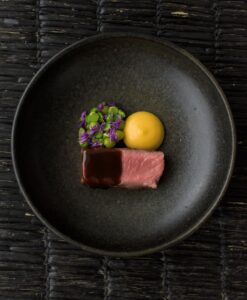Meza Malonga’s dinner is more than simply a meal; it’s a journey throughout the African continent. Nile fish from Uganda, olive oil from Algeria, and penja peppers from Cameroon all appear in delicately arranged meals.
Using ingredients and culinary traditions from several nations, founder and head chef Dieuveil Malonga has developed his own “Afro-fusion” cuisine, which he claims captures the history and customs of a wide and diverse continent. Malonga also believes that this cuisine would inspire a “revolution” in African cuisine.
CNN reports Malonga asserting that the culinary variety in Africa is astounding. “The world is unaware of the incredible ingredients and recipes we have.”
Malonga, who was raised in Germany and started his career in some of Europe’s top Michelin-starred restaurants before setting out on a two-year voyage around Africa in search of inspiration for his restaurant, was born in Brazzaville, in the Republic of Congo. He relocated to Kigali, Rwanda, and launched his own restaurant there in 2020 with the intention of promoting African dishes and products.
Despite the praise his restaurant has garnered for its inventive cuisine, Malonga has high hopes for the wider African eating scene.
Malonga decided to take education into his own hands and established a training school in his restaurant after establishing the web portal “Chefs in Africa,” which to date connects over 4,000 aspiring chefs and culinary professionals to employment possibilities and skills development.
Malonga is on a mission to lay the groundwork for an inventive fine-dining scene on the African continent that can compete with that of Europe while retaining its own distinctive African flair, in an effort to generate the next generation of culinary innovators.

“The school of grandmothers”
At Meza Malonga, the approach to fine dining is different from Europe’s, says Malonga.
“I was trained and worked at Michelin-star restaurants in Germany and then southern France, but my concept is very different,” says Malonga, adding that the culture in Europe was one of exclusivity and competitiveness. “I focus more on education.”
“If you want to go far, you must share with people,” he adds.
His Afro-fusion cuisine has been shaped by this philosophy of sharing. Malonga visited 48 of the 54 African countries in a bid to better understand the diverse traditions, dishes, and ingredients.
“I would go into the villages and go to meet the grandmothers because they have amazing, old techniques,” says Malonga, who adds that his love of cooking comes from his own grandmother.
Malonga learned about regional fermentation and preservation techniques from these village matriarchs in what he refers to as “the school of grandmothers”—a very different kind of education from the more formal one he had previously received at a culinary school in Münster, Germany. They also shared their family recipes and local delicacies with Malonga.
Malonga created his distinctive style by fusing his skills in European cooking with his experiences with African cuisine. Although Malonga does not limit himself, traditional foods from ethnolinguistic groups like the Maasai, Bantu, and Zulu, as well as West African cuisine from Cameroon, the Ivory Coast, and Ghana, are prominent in his cooking.
Malonga claims he can produce a seamless experience of various cultures in a single meal by utilising the overlap in flavours and spices, ingredients, or cooking methods.
“Food doesn’t have a border,” says Malonga. “Many things are connected, and that helps me to be creative—that’s all in my cuisine.”
Global Recognition
While North African cuisine, like Moroccan and Egyptian fare, has been a mainstay of the global dining scene for decades, West African cooking has received less attention, but interest has been growing in recent years.
In 2018, the Nigerian restaurant Ikoyi became the first West African restaurant to receive a Michelin star in the UK. Chika’s, a multi-million-pound UK snack brand that emphasises Nigerian flavour, has also had meteoric success, demonstrating a growing interest in West African cuisine. In January 2021, the “Fufu Challenge,” a TikTok trend, challenged users to record themselves eating fufu for the first time. Fufu is a starchy dough frequently produced from fermented cassava. While the craze provoked debate and criticism from some in Africa, it also sparked a sustained interest in West African food among internet users in the US.
“People are now open to new experiences, and African food is now coming onto the market,” says Malonga, adding that the international fine dining scene is becoming more varied.
“When I was young, people were only talking about European cuisine. And then came Thai dishes, Asian cuisine, and now South American. Next will be African cuisine; that’s why we are preparing the market,” he adds.
Malonga asserts that endorsements from groups like Michelin and the 50 Best Restaurants of African Restaurants Abroad contribute to the enhancement of the culinary reputation of the continent. He would nevertheless prefer that these organisation focus more on African food within Africa.
“It’s very important to promote the food culture, restaurant scene, and products in Africa. Awards have helped many countries in Europe and elsewhere, and I hope that maybe that will be the same in Africa,” says Malonga.
Michelin still doesn’t cover the African continent, and in 2022, just one of the 50 Best Restaurants was awarded to a venue in Africa, compared to 29 in Europe. But Malonga was recognized by the 50 Best as a “champion of change” in 2022, and in March he was nominated as one of the new candidates for the Best Chef Awards Top 100.
A food revolution
Malonga’s dedication to education is evident in his latest venture: a purpose-built “culinary innovation village” in the rural, northern district of Musanze, Rwanda, expected to open in late 2024.
The Meza Malonga concept has evolved into this $1.5 million training facility/restaurant, where Malonga aims to continue his “food revolution” by reaching out to isolated and neglected populations. Malonga anticipates having more students from other African nations attend the school, which will expand the number of pupils he can instruct.
Malonga will also have the chance to develop his culinary abilities at the new venue. It is situated on the banks of Lake Ruhondo, giving access to fresh fish, and is close to the three-hectare farm from which Meza Malonga already obtains its vegetables. This farm also generates a plentiful supply of local produce because of the lush volcanic soil there.
“I like organic products; it’s very important for me to follow the whole process,” says Malonga, adding, “For me, Africa is the garden of the world.”
“It makes me proud to see what is happening now with African cuisine and the exposure we are getting,” he says. “The next food revolution is already here.”












